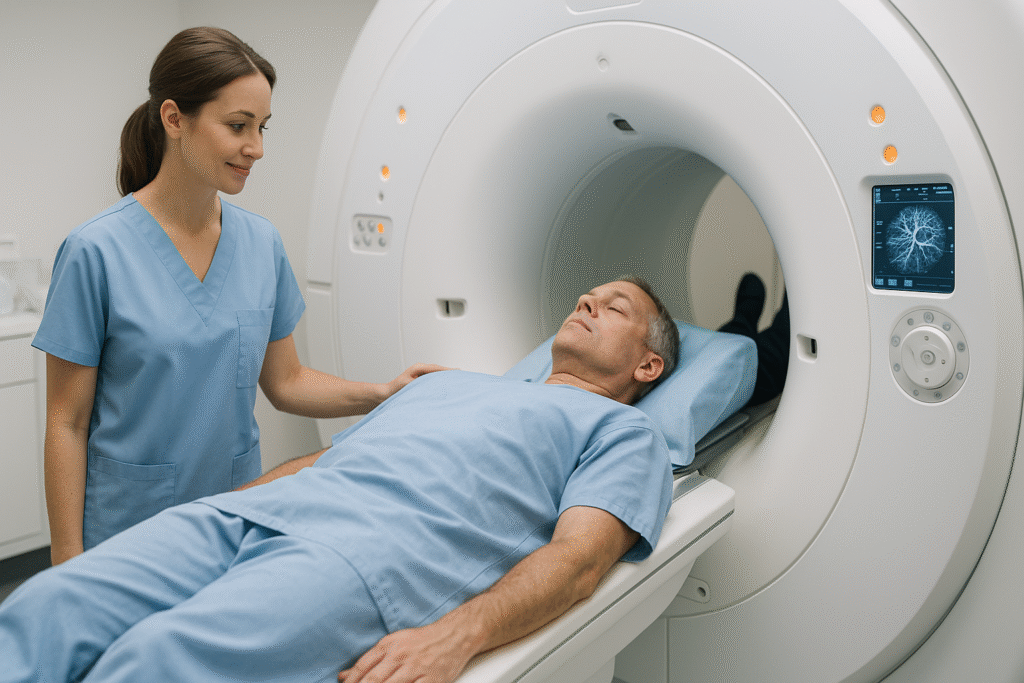In an era where healthcare systems face immense pressure to meet patient demands, AI technology in hospitals is proving to be a game changer. At Hull University Teaching Hospitals NHS Trust, cutting edge artificial intelligence has dramatically improved MRI scanning processes, enabling more patients to be seen without compromising image quality. This advancement reflects not only a technological milestone but a significant stride in patient care delivery.
The Promise of AI Technology in Hospitals
Hospitals across the UK and the world are embracing artificial intelligence to streamline operations, reduce workloads, and enhance diagnostic accuracy. The recent adoption of AI technology in hospitals like Hull Royal Infirmary and Castle Hill Hospital underscores this growing trend.
The AI software implemented at these facilities uses advanced algorithms to reduce background noise in MRI scans. This leads to sharper, clearer images while significantly cutting scan times. For patients, this translates to shorter appointments, quicker diagnoses, and improved overall experiences.
Karen Bunker, Head of Imaging at Hull University Teaching Hospitals NHS Trust, shared her insights-
“This means we can reduce the scanning time on certain sequences but still get the same imaging quality. It’s a breakthrough not only for our staff but more importantly for our patients.”
Hull’s AI Success Story
Hull’s hospitals are among the first in the region to introduce this pioneering technology. Both Hull Royal Infirmary and Castle Hill Hospital have seen tangible benefits from integrating AI into their imaging departments.
Since the introduction of AI technology, MRI departments have reported-
Up to 30% reduction in scanning times
Increased daily patient throughput
Enhanced image quality, aiding more accurate diagnoses
Improved patient comfort due to shorter scan durations
These improvements are not hypothetical but are being seen in real world clinical environments. Radiology departments, traditionally burdened with heavy workloads and growing waiting lists, now find themselves better equipped to meet patient demand.
The technology will soon be rolled out to Scunthorpe General Hospital and Diana, Princess of Wales Hospital in Grimsby, indicating broader confidence in the system’s benefits.
Expert Opinions on AI in Medical Imaging
Leading medical experts are optimistic about the role of AI technology in hospitals, particularly in diagnostic imaging.
Dr. Sophie Allen, an AI researcher at King’s College London, emphasized:
“Artificial intelligence is transforming how we approach diagnostic imaging. Algorithms can rapidly process data and enhance images beyond what the human eye can easily detect. This is not about replacing radiologists but empowering them with better tools.”
Similarly, Professor Mark Evans, a consultant radiologist, highlighted the importance of maintaining human oversight:
“While AI improves speed and precision, final interpretations must always rest with trained medical professionals. It’s a collaborative relationship between human expertise and machine efficiency.”
A Patient’s Perspective
For patients like 47 year old Sarah Mitchell from Hull, the impact of AI technology in hospitals goes beyond statistics.
Diagnosed with a neurological condition, Sarah has undergone multiple MRI scans over the past two years. Her recent scan at Castle Hill Hospital was markedly different.
“The whole process was so much quicker,” she explained. “The staff mentioned they were using new AI software, and I noticed the difference. Less time lying still in that machine made it far more comfortable.”
Her experience reflects how AI isn’t just transforming diagnostics it’s enhancing patient dignity and comfort during what can be stressful procedures.
Why AI Matters Now More Than Ever
The NHS, like many healthcare systems globally, faces unprecedented challenges: workforce shortages, increased patient demand, and the lasting impact of the COVID-19 pandemic. Integrating AI technology in hospitals is no longer a futuristic ambition but a practical necessity.
AI driven improvements in medical imaging directly address key concerns:
✅ Faster Diagnosis: Reduced scan times allow for more rapid results, essential for early detection of diseases like cancer or neurological disorders.
✅ Operational Efficiency: Hospitals can manage higher patient volumes without increasing staff workloads significantly.
✅ Cost Effectiveness: Although initial AI implementation requires investment, long term operational savings are substantial.
✅ Enhanced Patient Experience: Shorter, more comfortable scans improve patient satisfaction, crucial for healthcare quality ratings.
Furthermore, AI software is designed to learn and improve over time, suggesting that its benefits will only grow as systems evolve.
AI Technology Beyond Hull
Hull’s success is part of a broader, global shift toward embracing AI in healthcare. Countries like the United States, Germany, and China are investing heavily in medical AI to tackle similar challenges.
The UK’s National AI Strategy also emphasizes healthcare as a key sector for AI integration. Hull’s early adoption showcases how NHS Trusts can lead this transformation, serving as a blueprint for others nationwide.
The Future of AI Technology in Hospitals
Looking ahead, AI technology in hospitals is expected to extend beyond imaging. Applications are emerging in areas such as-
Predictive analytics for patient outcomes
AI assisted surgeries
Automated administrative tasks
Remote patient monitoring
The experience at Hull demonstrates that with thoughtful implementation, AI can significantly enhance care without diminishing human oversight.
The integration of AI technology in hospitals is not simply a technological upgrade it represents a cultural shift in healthcare. Hull’s pioneering use of AI for MRI scans illustrates how innovation, when driven by patient centered goals, can lead to remarkable improvements.
As more NHS hospitals follow Hull’s lead, the vision of faster, more efficient, and compassionate care becomes a reality, powered by the synergy between human expertise and artificial intelligence.

